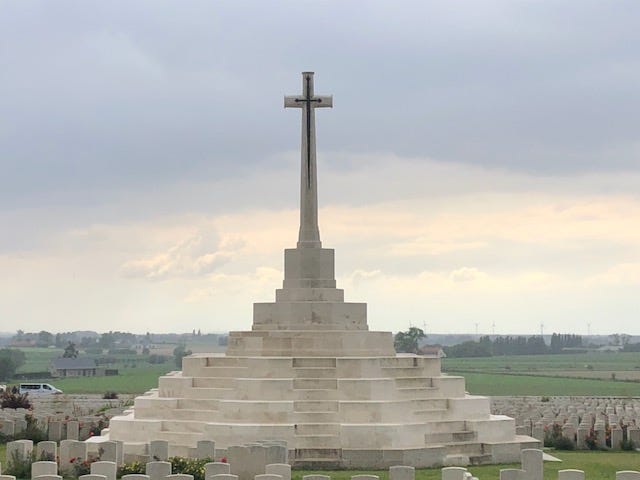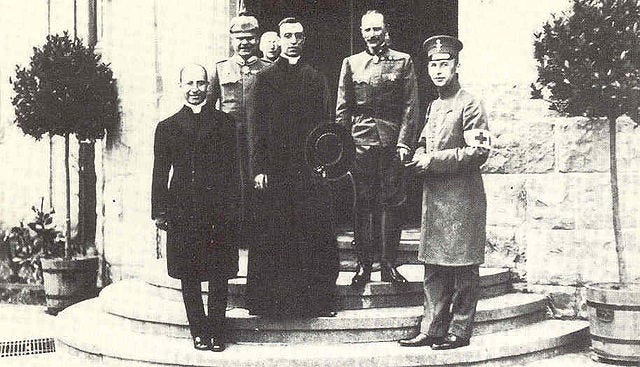When he was sitting on the Mount of Olives, the disciples came to him privately, saying, “Tell us, when will this be, and what will be the sign of your coming and of the end of the age?” Jesus answered them, “Beware that no one leads you astray. For many will come in my name, saying, ‘I am the Messiah!’ and they will lead many astray. And you will hear of wars and rumors of wars; see that you are not alarmed, for this must take place, but the end is not yet. For nation will rise against nation and kingdom against kingdom, and there will be famines and earthquakes in various places: all this is but the beginning of the birth pangs.
Matthew 24:3-8
I want to just thank everybody and in particular, God, I want to just say we love you, God, and we love our great military, protect them. God bless the Middle East. God bless Israel, and God bless America. Thank you very much. Thank you.
Donald Trump, addressing the nation last night
Most of my graduate training as a historian is in the strategy and diplomacy of Great Powers and the history of U.S. foreign policy, but I’m not sure yet what to tell you about last night’s American air strikes on three Iranian nuclear sites. The politics, international and domestic, are complicated as it is, and I don’t think even his closest advisers truly understand what an American commander-in-chief who campaigned on promises to stop U.S. involvement in foreign wars is up to in the Middle East. I hope that this will be the precursor to a negotiated peace rather than the escalation of a war few Americans would have sought, but I fear that we’re about to find out the cost of our nation entrusting so much power to a weak man’s idea of a strong leader.
All I know for sure is that people of all faiths and none at all all have yet more reason to grieve that humanity’s warring madness has not yet been cured. Even if some lasting good comes of last night’s attacks, that uncertain result will not unkill the dead, unmaim the wounded, or uncry the tears of the grieving.
Maybe because I spend so much time thinking about that kind of violence and sorrow, I’ve never been one of those Christians who spends a lot of time thinking about what Jesus’ disciples call “the end of the age.” So much of my professional life revolves around teaching “wars and rumors of wars” that they don’t like ominous portents of a millennium to come so much as the constant refrain of millennia past echoing into our present.
In every class I teach, I tell at least one story of nations rising against nations — and often nations being torn apart by the experience. And then there’s my three-course sequence of twentieth century conflicts. It will end next fall when I teach The Cold War — the story of a nuclear apocalypse that didn’t happen, and lots of smaller wars that did — which is a kind of sequel to my course next January on World War II. But first, this summer I’m teaching part one in that awful trilogy: an online summer version of World War I.
In fact, just the other day I recorded a lecture for that class in which I repeated a Christian leader quoting Jesus’ words from Matthew 24:5-6. Here’s how Pope Benedict XV described the global situation in November 1914:
…as soon as we were able from the height of Apostolic dignity to survey at a glance the course of human affairs, our eyes were met by the sad conditions of human society, and we could not but be filled with bitter sorrow. For what could prevent the soul of the common Father of all being most deeply distressed by the spectacle presented by Europe, nay, by the whole world, perhaps the saddest and most mournful spectacle of which there is any record[?]. Certainly those days would seem to have come upon us of which Christ Our Lord foretold: “You shall hear of wars and rumours of wars - for nation shall rise against nation, and kingdom against kingdom.”
Pope Pius X had died just weeks after the declaration of war, so a papal conclave was held in still-neutral Italy even as German armies rushed towards Paris in early September 1914. The archbishop of Bologna, Giacomo della Chiesa, was elected spiritual leader of Catholics fighting on both sides of what was already the worst war in generations.

With the failure of the German offensive in France, the war’s western front started to settle into futile stalemate that fall, so it was no surprise that the new pope, who took the name Benedict XV, dedicated his first encyclical to a call for peace. As Adolf Hitler and hundreds of thousands of other German troops tried to break through British lines at the Belgian city of Ypres (Ieper), Benedict issued Ad Beatissimi Apostolorum on All Saints’ Day, when the faithful mourned the mounting number of faithful departed.
As I told students in my lecture, Benedict had an unusually clear-eyed view of what was coming in a war that — despite his mediation efforts — would not be over for several Christmases to come. Months before the German Army deployed chemical weapons at the Second Battle of Ypres — and decades before the adjectives atomic and nuclear entered the lexicon of warfare — the pope understood that “the greatest and wealthiest nations of the earth… well provided with the most awful weapons modern military science has devised” would “strive to destroy one another with refinements of horror.” Two years before the twin battles of Verdun and the Somme exceeded all records for casualties, he warned that there would be “no limit to the measure of ruin and of slaughter….” And Benedict saw that the trauma and damage of modern wars would not be confined to battlefields: “…day by day the mighty number of widows and orphans increases, and with the interruption of communications, trade is at a standstill; agriculture is abandoned; the arts are reduced to inactivity; the wealthy are in difficulties; the poor are reduced to abject misery; all are in distress.”

I pray that what’s happening now in Iran and Israel will not develop into anything like a world war. But whether large or small, it’s worth noting that Benedict also saw that war stems from deeper conflicts that could only be reconciled through the Prince of Peace and his gospel. “Our Lord Jesus Christ came down from Heaven for the very purpose of restoring amongst men the Kingdom of Peace,” he continued, “which the envy of the devil had destroyed, and it was His will that it should rest on no other foundation than that of brotherly love.” For all the rhetoric of perpetual peace that preceded 1914, “in reality never was there less brotherly activity amongst men than at the present moment.” It’s hard to read what he wrote next, since it could as easily describe our present moment as his:
Race hatred has reached its climax; peoples are more divided by jealousies than by frontiers; within one and the same nation, within the same city there rages the burning envy of class against class; and amongst individuals it is self-love which is the supreme law over-ruling everything.
It didn’t happen in 1914, but in 2025 may Christians of all nations and traditions “strive in every possible way that the charity of Jesus Christ should once more rule supreme amongst men.” Do not be alarmed by wars and rumors of war, but also do not accustom yourselves to the demands they make on your loves and your loyalties. Do not be led astray by those who would use religion to divide and destroy; instead, “let us never cease from reechoing in the ears of men and setting forth in our acts, that saying of St. John: ‘Let us love one another’ (1 John 3:23).”
Next week’s lectionary readings: 2 Kings 2:1-2, 6-14; Psalm 77:1-2, 11-20; Luke 9:51-62; Galatians 5:1, 13-25.




Thanks so much for your insight, Chris. Especially struck by the unkill, unmaim, etc picture. Have a great Sunday.